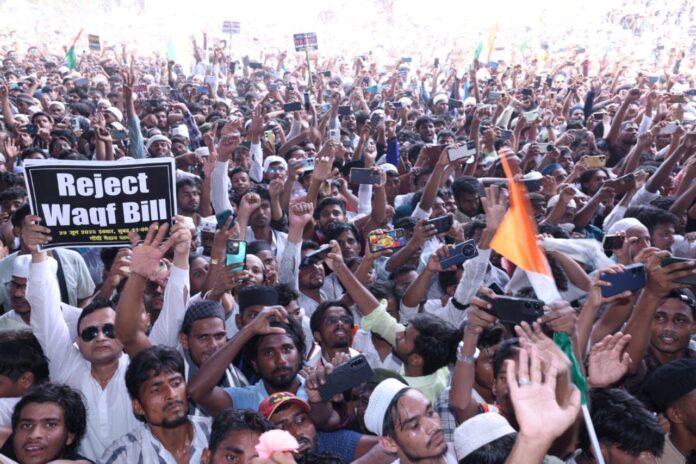By Special Correspondent
Patna, 29 June 2025
In the blistering heat of a June afternoon, where even the city’s concrete seemed to shimmer with tension, Patna’s historic Gandhi Maidan bore witness to a spectacle that defied both weather and cynicism. Lakhs of people—men, women, youth, elderly, veiled mothers with children in arms—poured into the ground, answering a singular call: “Waqf Bachao, Dastoor Bachao.”
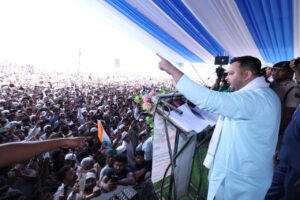
Organised under the banner of Imarat-e-Shariah (Bihar, Odisha, Jharkhand, Bengal), the gathering was not merely a protest against the contentious Waqf Amendment Act 2025, but a deeply symbolic assertion of constitutional fidelity and religious conscience. The scale? Unprecedented. The discipline? Immaculate. The message? Unmistakable.
Yet beneath the electrifying visuals and the rhythmic echoes of unity, a series of unspoken questions began weaving themselves into the very narrative that unfolded on the ground.
An Assembly of the Faithful, a Test of Intent
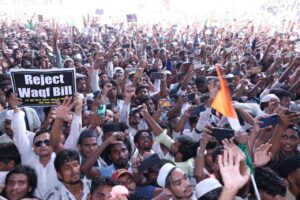
Presiding over the event was Hazrat Maulana Ahmad Wali Faisal Rahmani, the scion of the revered Maulana Wali Rahmani, who in 2018 had set a similar stage with the “Deen Bachao, Desh Bachao” rally—one that had stirred the Muslim masses and briefly recalibrated Bihar’s political arithmetic.
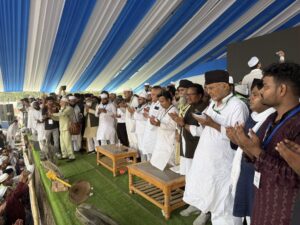
Now, seven years later, the son occupies the same stage, facing a more aggressive legal regime and a more fragmented national mood. The sea of attendees at his call cannot be denied. Nor can the question: Is this a moment of genuine mobilisation—or a carefully orchestrated one-man show?
A Repeat of 2018? Or a Divergence with Depth?
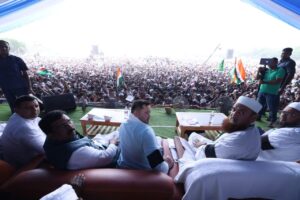
Observers of Bihar’s socio-political currents recall that the 2018 rally gave birth to Khalid Anwar’s legislative career, but not much else. Despite its volume and vigour, the movement did not crystallise into a lasting structure or a unified front. Critics now fear whether the 2025 edition—though logistically superior and emotionally charged—may also dissipate into the political ether.
Is history repeating itself, or is something fundamentally different this time?
In a development both subtle and significant, the All India Muslim Personal Law Board (AIMPLB)—the very body known for spearheading national-level advocacy on Waqf and personal law issues—was nowhere to be seen. No official representation, no symbolic gesture of endorsement, not even a message read out in abstentia.
Was the Board deliberately sidelined? Or did it choose not to engage? And if the latter, does it point towards an emerging cleavage between Imarat-e-Shariah and other Muslim institutions in India? Has this issue—deeply constitutional in nature—been narrowed down to a regional clerical identity?
Or, as some critics whisper: was this massive mobilisation an attempt by Faisal Rahmani to reassert his legitimacy as “Ameer-e-Shariat” by sheer force of numbers?
The Spirit of the Ground
None of these questions, however, diminish the truth of what Gandhi Maidan became today: a canvas of collective resolve. There was no violence, no chaos, no political grandstanding. Only placards, prayers, and purpose.
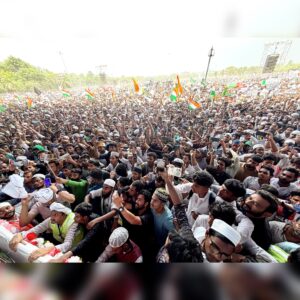
The speeches—from both clerical and secular voices—struck a consistent chord: that the Waqf Amendment is a direct encroachment on religious freedom and institutional autonomy. That Waqf is not merely a legal entity, but a sacred trust meant for mosques, madrasas, graveyards, community welfare—not to be tampered with by executive fiat or bureaucratic oversight.
One orator’s words hung in the air:
“Those who cannot stitch hearts, cannot hold a nation together. What is Waqf, if not an embodiment of selfless giving, of historical memory, of spiritual trust? And what is the Constitution, if not its shield?”
Traffic Jams, Unshaken Faith
Meanwhile, Patna’s newly built JP Ganga Path was paralysed with a six-kilometre jam. Yet, there was no honking, no frustration. Police officials were left stunned not by the crowd, but by its restraint. Orders were issued to close Marine Drive shops and divert movement. The city adapted, but the crowd did not bend.
Many compared the rally’s discipline to the much-touted political rallies of the ruling party—whispering that even Prime Minister Modi’s largest Bihar gatherings hadn’t summoned such organic participation.
The Road Ahead: Unwritten, Yet Watchful
The rally ended with a soul-stirring dua by Hazrat Amir-e-Shariat. There was no chaos at dispersal, no conflict with police, and no lingering debris of violence—only resolve.
But the bigger story lies ahead.
- Will this lead to structured resistance—in courts, in parliaments, on ballots?
- Will it coalesce into a joint Muslim platform, or remain confined to Patna’s symbolism?
- Will Faisal Rahmani emerge as a new axis of Muslim mobilisation, or will this too, fade like his father’s rally, into the folds of noble memory?
And perhaps most crucially—will the government pause to listen?
Because the ground has spoken. And it did so not with slogans, but with silence, with solidarity, with spine.
____________________________________________________________
Qalam Times News Network will continue to track the implications of this movement—inside courtrooms, within party war-rooms, and most importantly, in the hearts of the people.
For exclusive rights, reprints, or editorial queries, contact editorial@qalamtimes.in

